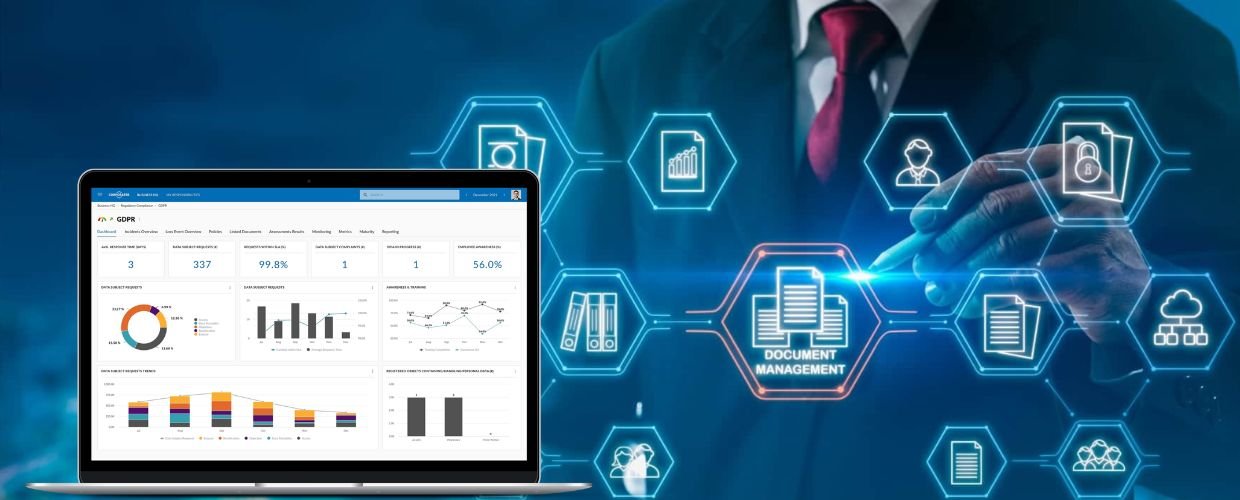Manual compliance management processes can be time-consuming, prone to errors, and difficult to track. Businesses are turning to Governance, Risk, and Compliance (GRC) software solutions to streamline and optimize compliance management. This article explores the concept of efficient compliance management and highlights the benefits of using GRC software to enhance processes. Efficient compliance management involves proactive measures to identify and mitigate risks.
Understanding Compliance Management
In today’s complex regulatory landscape, compliance management is critical to running a business successfully. Organizations must adhere to many regulations, standards, and industry requirements to maintain legal and ethical operations. Compliance management refers to organizations’ practices, procedures, and tools to ensure adherence to relevant laws, regulations, and industry standards.
It involves identifying applicable requirements, assessing organizational compliance, implementing controls, and monitoring ongoing adherence. Efficient compliance management is crucial to mitigate risks, protect the organization’s reputation, and avoid penalties or legal consequences. Effective communication and collaboration between departments are key for efficient compliance management.
Challenges in Compliance Management
The regulatory landscape constantly evolves, with new laws, regulations, and compliance requirements emerging regularly. Staying up-to-date with these changes can be a significant challenge for organizations. GRC software solutions help organizations stay abreast of regulatory updates by providing automated monitoring and alert systems that track and notify businesses of changes relevant to their operations. Businesses must stay current with changing regulations and adjust their compliance management strategies accordingly.
Manual and Fragmented Processes
Many organizations still rely on manual processes, spreadsheets, and disparate systems to manage compliance. This approach is time-consuming, error-prone, and lacks visibility and centralization for effective compliance management. GRC software streamlines and centralizes compliance processes, providing a unified platform for managing compliance-related data, tasks, and documentation.
Lack of Accountability and Oversight
Inefficient compliance management can lead to a lack of accountability and oversight, as responsibilities and tasks may be unclear or scattered across different departments. GRC software allows organizations to assign responsibilities, track progress, and establish clear workflows, ensuring accountability and providing a holistic view of compliance activities.
Inadequate Risk Assessment and Mitigation
Effective compliance management requires thorough risk assessment and mitigation strategies. Organizations may overlook potential risks without proper risk assessment tools and frameworks or fail to implement appropriate controls. GRC software solutions offer robust risk assessment and mitigation functionalities, helping organizations proactively identify and address compliance risks.
Benefits of GRC Software in Compliance Management
GRC software provides a centralized platform for managing all compliance-related activities. It allows organizations to create and maintain a centralized repository of regulations, policies, and control frameworks. This centralization facilitates easier access, better collaboration, and efficient management of compliance processes, ensuring consistency and reducing duplication of efforts. Utilizing technology such as automation and AI can greatly improve the efficiency of compliance management processes.
Automation and Efficiency
GRC software automates manual and repetitive compliance tasks, saving time and decreasing the risk of errors. It provides workflows, task management, and document control features, streamlining compliance processes and increasing operational efficiency. Automated reminders and notifications ensure deadlines are met and tasks are completed on time. Regular employee training and education can foster a business’s compliance culture.
Risk Assessment and Monitoring
GRC software enables organizations to conduct comprehensive risk assessments by providing risk assessment frameworks, customizable risk matrices, and risk identification tools. It facilitates continuous monitoring and assessment of risks, allowing organizations to identify and mitigate potential compliance issues before they escalate proactively.
Regulatory Compliance Tracking
GRC software simplifies the tracking of regulatory changes and ensures organizations comply with the latest requirements. It provides real-time updates on regulatory changes, alerts, and notifications, allowing businesses to adapt their processes accordingly. This tracking capability reduces the risk of non-compliance and associated penalties.
Enhanced Reporting and Analytics
GRC software offers robust reporting and analytics capabilities, enabling organizations to generate comprehensive compliance reports, audit trails, and performance metrics. These reports provide insights into compliance status, areas of improvement, and potential risks. The ability to visualize and analyze compliance data helps organizations make informed decisions and drive continuous improvement.
Conclusion
Efficient compliance management is crucial for organizations to navigate the complexities of regulatory requirements and mitigate risks effectively. By leveraging GRC software solutions, businesses can streamline and optimize compliance processes, ensuring adherence to regulations while minimizing manual effort and errors. The benefits of using GRC software include centralized compliance management, automation of tasks, effective risk assessment, proactive monitoring, and enhanced reporting capabilities. Embracing GRC software empowers organizations to maintain compliance, protect their reputation, and focus on strategic growth and success.



